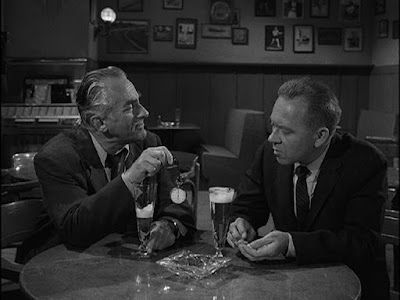 |
| Patrick McNulty (Richard Erdman) receives a gift from his new friend, Mr. Potts (Leon Belasco) |
“A Kind of a Stopwatch”
Season Five, Episode 124
Original Airdate: October 18, 1963
Cast:
Patrick Thomas McNulty: Richard Erdman
Joe: Herbie Faye
Potts: Leon Belasco
Secretary: Doris Singleton
Mr. Cooper: Roy Roberts
Charlie: Richard Wessel
Bar Room Patron: Ken Drake
Attendant: Ray Kellogg
Television Announcer: Sam Balter
Frozen man / Close-up shots of McNulty’s hand: Robert
McCord
Crew:
Writer: Rod Serling (teleplay based on an unpublished
story idea by Michael D. Rosenthal and Jerry McNeely (uncredited))
Director: John Rich
Producer: Bert Granet
Director of Photography: Robert Pittack, a.s.c.
Production Manager: Ralph W. Nelson
Art Direction: George W. Davis, Walter Holscher
Film Editor: Richard Heermance, a.c.e.
Set Direction: Henry Grance, Robert R. Benton
Assistant Director: Charles Bonniwell, Jr.
Casting: Patricia Rose
Music: Van Cleave
Sound: Franklin Milton, Phillip N. Mitchell
Mr. Serling’s Wardrobe: Eagle Clothes
Filmed at MGM Studios
And Now, Mr. Serling:
“Next time on The Twilight Zone, we probe into the element of time and present a very oddball opus entitled ‘A Kind of a Stopwatch.’ We tell the story of a man, a stopwatch, and an incredible deviation to the norm, said norm being the usual twenty-four-hour day, said deviation involving what happens when a stopwatch is pushed and everything stops, not just time. To titillate and intrigue, ‘A Kind of a Stopwatch.’ Next, on Twilight Zone.”
Rod Serling’s Opening Narration:
“Submitted for your approval, or at least your analysis, one Patrick Thomas McNulty, who at age forty-one is the biggest bore on Earth. He holds a ten-year record for the most meaningless words spewed out during a coffee break. And it’s very likely that, as of this moment, he would have gone through life in precisely this manner. A dull, argumentative bigmouth who sets back the art of conversation a thousand years. I say he very likely would have except for something that will soon happen to him. Something that will considerably alter his existence, and ours. Now you think about that now because this is, the Twilight Zone.”
Summary:
Patrick McNulty is an irritating motormouth with a penchant for unrealized ambitions. The world would function better if someone simply gave him a chance to fix it. He is despised by both co-workers and acquaintances but seems mostly unaware of this fact. After continuously avoiding his job duties to pitch irrelevant financial schemes to his boss, he is fired.
Later, after managing to chase away nearly all of the clientele from his neighborhood bar, McNulty introduces himself to the only person left. Potts, an older man who seems very drunk, gifts McNulty a stopwatch and after a very confusing explanation, gets up and leaves. Joe, the owner of the bar, complains that McNulty repeatedly drives away his customers. As Joe sweeps up for the night, McNulty fiddles with his new gift. Suddenly, Joe freezes. Thinking it’s a gag, McNulty investigates and then looks at the stopwatch. He presses the button and Joe continues sweeping. McNulty presses the button again. Joe’s movements cease. He presses it again and Joe continues. Confused, he decides to leave.
At his apartment later, McNulty continues to test the stopwatch. He clicks the button and his goldfish stops moving. He decides that he simply needs some sleep but when he get ups the next morning he tries it again with the same results. He then walks over to the window and tries the button. Traffic outside stops completely. McNulty now realizes what he has been given.
The next day, McNulty arrives at his old job to show his formers co-workers that he finally has something worthy of their attention. After being told to leave, he clicks the stopwatch and proceeds to rearrange things in the office. Afterwards, McNulty goes to the bar to try to prove his worth but no one takes him seriously there either. He clicks the watch and the world stops. He attempts to give the bar patrons the same treatment he gave his co-workers but his hijinks go mostly unnoticed.
Testing the limits of his new authority, McNulty decides to rob a bank. As he wheels a mountain of cash towards the front door, he loses his grip on the stopwatch and it falls to the ground. He picks it up and clicks it repeatedly but nothing happens. The people in the bank remain frozen. Stunned, he races to the office, and then to the bar, but finds the same situation everywhere he goes. Everyone is silent. Everything is still. The world has simply stopped. Patrick McNulty, the conversationalist, is now the sole inhabitant of a lifeless planet.
Rod Serling’s Closing Narration:
“Mr. Patrick Thomas McNulty, who had a gift of time. He used it and misused it, and now he’s just been handed the bill. Tonight’s tale of motion and McNulty, in the Twilight Zone.”
Commentary:
“A Kind of a Stopwatch” is the fourth episode of the show’s final season and, while an enjoyable one, it is certainly flawed and feels like a bit of a let-down after the three stellar episodes that precede it. It’s premise, already a well-worn narrative of the genre when this episode first aired, is instantly predictable and altogether uninteresting, with a plot that frequently ignores logic. However, because of its well-executed twist ending, it has become one of the more memorable episodes from the show’s final season. It has been spoofed on The Simpsons, Futurama, Johnny Bravo, Wings, and numerous other television programs and its premise was recycled for the debut episode of the 1980’s revival series of The Twilight Zone in the segment “A Little Peace and Quiet.” It is also one of several episodes referenced by Dan Aykroyd and Albert Brooks during the prologue of Twilight Zone: The Movie (1983)—it is, in fact, the episode that Brooks mistakenly insists is an episode of The Outer Limits. It’s an episode that has become an iconic part of the show but its origins went somewhat unknown for decades.
In the early sixties, Michael D. Rosenthal was a student at the University of Wisconsin. One of his professors was a young screenwriter named Jerry McNeely. McNeely sold his first script, “The Staring Match,” to Studio One in 1957 and by the time that “A Kind of a Stopwatch” aired he had seen a dozen or so of his scripts made into episodes of various television series including Dr. Kildare, for which he eventually wrote ten episodes. Unusual for the time, McNeely chose to remain a faculty member in the university’s speech department even though he was achieving success as writer, sending in scripts through the mail and taking the occasional trip to Los Angeles to meet with agents and producers. One day in class Rosenthal pitched McNeely an idea about a stopwatch that could stop time and restart it again with the simple click of a button. Not an earth-shattering premise but one that McNeely thought that he could sell to a television series. So he pitched it to his agent with the insistence that Rosenthal receive the onscreen credit if they were able to land a sale. His agent knew Rod Serling and thought it would be well-received on The Twilight Zone so McNeely wrote a five paragraph synopsis and Bert Granet agreed to buy it for Cayuga Productions.
This is Rosenthal’s only credit as a writer and for many years no one knew exactly who he was. Many assumed it was a pseudonym. Jerry McNeely went on to a successful career in television, writing scripts for numerous television series and later creating the ABC series Owen Marshall, Counselor at Law. He was also nominated for an Emmy for penning the CBS drama Something for Joey in 1977. While McNeely declined screen credit for “A Kind of a Stopwatch,” he did use the interaction to get on the radar of Serling and company who then hired him to adapt the Henry Slesar story “The Self-Improvement of Salvadore Ross” which aired later in the fifth season.
McNeely’s original one-page story, reprinted in full in Martin Grams, Jr.’s The Twilight Zone: Unlocking the Door to a Television Classic (OTR, 2008), differs from the episode in many ways and Serling wrote numerous drafts of the script before arriving at the story that everyone now knows. In McNeely’s version, a man buys a second-hand chronometer from a pawnshop. After discovering that the stopwatch mechanism is broken, he tinkers with it and manages to fix it only to discover that he can stop the flow of time with the click of a button. At first, he uses it to seek petty vengeance on the people who have wronged him in the past. Then he gets the idea of robbing a bank. His plan is to stop time and drive from New York to California, rob a very large, prominent bank, and then drive back to New York and restart time. His reasoning, of course, is that the money can never be traced to him and if it is he can easily prove that he was in New York the entire time. His long trip across an America suspended in time proves to be boring and lonely and he begins to miss civilized conversation. After the robbery proves successful, he decides that he will place himself into a position of political power. However, before he can achieve his goal he drops the stopwatch while time is suspended and it breaks into several dozen pieces.
Serling keeps many elements of McNeely’s treatment but fleshes it out into a full episode, making McNulty a motor mouth and filling the script with clever dialogue. Serling’s greatest achievement here isn’t the twist ending itself, which is both incredibly predictable and also highly reminiscent, both visually and thematically, of season one’s “Time Enough at Last” in which Burgess Meredith plays a bookworm who just wants peace and quiet so he can read and then ends up shattering his bifocals after an atomic bomb wipes out most of humanity. The script’s greatest strength is the abrupt tonal shift from a light, whimsical comedy to something much darker. Although the audience never really hates Patrick McNulty, thanks mostly to Erdman’s performance, they certainly never sympathize with him, at least not until the final few moments of the episode. The sixty seconds or so where the audience witness Erdman's cries to the universe for help are quite moving and leave the audience with a feeling of empathy for a character that exists, for most of the episode, as a comedic punching bag.
The main flaw in Serling’s script is found in the character of Potts and the ambiguous origins of the magical stopwatch. McNeely’s synopsis sees the main character purchase a used stopwatch at a second-hand store, having never seen it before, which is really the perfect origin story. It renders the stopwatch completely anonymous and ignores any explanation about where it came from or how it acquired its magical features. It simply exists. As far as the audience is aware, no other living person knows about it. Serling apparently felt the need to give the stopwatch some kind of an origin so he created Potts, the inebriated man in the bar whom McNulty buys a drink. Often, in stories of a similar likeness, stories where one person is given a magical trinket or such by another person, like the potion in season one’s “The Chaser” or even the genie’s wishes in season two’s “The Man in the Bottle,” the giver of the trinket is clearly aware of the ominous nature of the gift and what can happen to its owner when it is abused. Serling appears to deliberately forgo this trope here as Potts seems to have no knowledge of the stopwatch’s supernatural abilities. He simply says that it is a family heirloom, which makes the plot of the story questionable. Has the stopwatch always had magic powers or is this a new development? And if it has, why doesn’t Potts know about it? Surely, he pressed the button on the stopwatch at least once, just to see if it worked, even if it has been in his possession only a short time. Or if the ability to stop time with the stopwatch is exclusive to McNeely for some reason then what is the reason? On top of all this, Potts utters a string of random, dated references that leave the viewer puzzled as to both their meaning and their purpose in the story.
When McNulty greets his new friend he asks him, “What do you know, what do you say?” Potts responds with three phrases. The first thing he says is “fifty-four forty or fight,” which was a well-known political slogan coined by President James K. Polk while running for office in 1844. It refers to the United States’ dispute with the British over the area of land which now makes up Oregon, Washington, and Idaho. He then says “Damn the torpedoes, full speed ahead,” a very famous military command given by United States Navy Admiral David Farragut in 1864 during the Battle of Mobile Bay in the American Civil War. His final greeting is “It takes a heap of living to make a house a home,” a line taken from the poem “A Heap o’ Livin” (1916) by Edgar A. Guest, a hugely popular American poet during the first half of the century. Potts later references Abner Doubleday, a Union Army Major General during the Civil War who is often credited with having invented baseball.
These references were all at least fifty years old when this episode aired in 1964 and, as far as can be determined given the conversation that follows, are all completely random and contain no insight into who Potts is or where the stopwatch came from. Serling’s intention with these phrases is likely to imply that Potts, who has a very noticeable Russian accent, has immersed himself in American history and culture in order to adjust to his new home. The scene’s ambiguity does give Potts and the stopwatch an added layer of mysticism but, ultimately, something is lost in translation from page to screen. It feels like Serling was a bit uncertain with this character and it only adds to a tapestry of flaws throughout the episode.
If “A Kind of a Stopwatch” has a saving grace aside from its effective ending, it is the sheer likability of its leading man, Richard Erdman, who gives a brilliant comedic performance as the unfortunate Patrick McNulty. This was Erdman’s only appearance on The Twilight Zone but several years earlier he appeared in the Robert Parrish western Saddle the Wind (1958), for which Serling wrote the screenplay. Erdman was signed to a contract with Warner Brothers while still a teenager and his career as an actor spanned over seven decades. He was often cast in comedic roles as rowdy sailors or awkward outcasts, similar to the role he plays here, although a number of his well-known roles were as serious characters. Probably his most well-known film role was as the American P.O.W. squad leader in Billy Wilder’s masterful World War II film, Stalag 17 (1951). Other notable film roles include Fred Zinnemann’s The Men (1950), Robert Parrish’s Cry Danger (1951), Fritz Lang’s The Blue Gardenia (1953), and the World War II film Tora! Tora! Tora! (1970). The last decade of his career saw a renewed interest from the public when he was cast as elderly college student Leonard in the massively successful television series Community.
His performance here is impressive mostly because of McNulty’s complete and total lack of social awareness but also because he remains in motion for much of the episode, giving an otherwise dull story a continuous surge of energy. McNulty is repeatedly insulted throughout the episode by almost everyone he comes into contact with and the audience is led to believe that he is either totally oblivious to their contempt for him or he simply doesn’t care, a line Erdman tiptoes remarkably well. This causes McNulty to bounce from character to character vying for the attention of anyone who will listen, a device that would tire easily in the hands of a lesser actor but Erdman takes a well-measured approach and even manages to make McNulty sort of likable. According to Erdman, McNulty speaks so quickly and has so much dialogue in this episode that he was still memorizing pages of the script between each take.
The supporting cast here is a mix of fairly recognizable performers from the golden age of television. Herbie Faye, who plays Joe the bartender, appeared as Cpl. Sam Fender on four seasons of The Phil Silvers Show and again on The New Phil Silvers Show. He also appeared in the 1962 film version of Rod Serling’s Requiem for a Heavyweight where he also plays a bartender. Doris Singleton is probably best remembered for her appearances on I Love Lucy and several other Lucille Ball programs. She also had a reoccurring role on My Three Sons. Russian actor Leon Belasco enjoyed a highly prolific career that spanned over half a century. He had small roles in a handful of major films including Casablanca (1942), Holiday Inn (1942), Yankee Doodle Dandy (1942), Son of Ali Baba (1952), and The Art of Love (1965). A lifelong musician, he was often cast as band leaders or solo musicians as well as numerous shop owners, waiters, or hotel attendants. Roy Roberts also had a long career as an actor appearing in many western and war films. His notable film roles include My Darling Clementine (1946), He Walked by Night (1948), House of Wax (1953), and Chinatown (1974). He also had reoccurring roles on several television series including Oh! Suzanna, McHale’s Navy, The Beverly Hillbillies, Petticoat Junction, and Gunsmoke. And, finally, the voice of the television broadcaster here is that of basketball player turned famed sportscaster Sam Balter.
This was the second and final episode of The Twilight Zone for director John Rich. Rich also directed the season two episode “A Most Unusual Camera,” another story that concerns supernatural gadgetry. Rich began his career at the dawn of television directing episodes for many of the live anthology dramas of the time, eventually working his way into episodic television in the late fifties. Today he is remembered for his work on The Dick Van Dyke Show and All in the Family, both of which earned him Primetime Emmy Awards. In the 1980’s he formed a television production company with friend Henry Winkler called, appropriately, Henry Winkler/John Rich Productions where they were executive producers for the CBS series MacGyver. He also directed numerous episodes of Gunsmoke, Bat Masterson, Where’s Raymond?, Gomer Pyle: USMC, The Brady Bunch, and Benson. His brief career as a feature film director includes the Janet Leigh romantic comedy, Wives and Lovers (1963), the Elvis Presley films, Roustabout (1964) and Easy Come, Easy Go (1967), and the slapstick comedy, Boeing, Boeing (1965), with Tony Curtis and Jerry Lewis.
Not counting the sequences of awkward stock footage that appear at various points throughout the episode, Rich’s direction in “A Kind of a Stopwatch” is really quite good. As we discussed in our reviews for several earlier episodes that feature tableau scenes of motionless characters like season one’s “Elegy” and season three’s “Still Valley,” filming someone or something that is suspended in time is incredibly difficult. No human being can appear perfectly still for more than a few seconds so to counteract their involuntary movements directors often keep the camera in constant motion so the audience doesn’t get a glimpse of someone blinking or twitching. Rich accomplishes this exceedingly well here by simply letting Richard Erdman pace relentlessly through several different scenes while his co-stars stand still around him. The problem with solitary objects is that to make them appear suspended in time, for instance to make a baseball appear frozen in mid-air, directors from this period often had to rely on still photography which is immediately noticeable to the audience. Rich does his best to avoid this but CBS likely favored as many stock images as possible as it was cheaper. In one effective shot during the office scene after McNulty breaks the stopwatch, a tissue is seen suspended in mid-air above a trash can while McNulty remains in motion behind it.
A quick mention should be made of Van Cleave's original score here which adds some much-needed atmosphere to the episode. There are two main pieces of music in this episode, one used to emphasis the audience's view of McNulty's character, that he is laughably unlikable, and another, faster piece used during the scenes in which time is suspended. This second piece is clever as its fast, repetitive pace induces a sense of anxiety in the audience that McNulty will somehow be caught during one of his escapades. The payoff for this comes at the end of the episode when McNulty breaks the stopwatch and the music abruptly stops and both the audience and McNulty are plunged into total silence, giving the audience a sense of the world in which McNulty is now doomed to live.
As noted earlier, the premise for “A Kind of a Stopwatch” was recycled for a segment during the premiere episode of the first revival of The Twilight Zone in September, 1985 called “A Little Peace and Quiet.” The only similarity between the two stories is the notion that one person can stop and start time all by themselves. There is also a visual similarity because both shows feature scenes with actors frozen in place and a lot of creative camera work to make it seem genuine. Also, like the original episode, the ending is an abrupt switch from situational comedy to a genuinely bleak aftermath. Aside from these similarities, the two stories are very different and neither Serling, Rosenthal, nor McNeely receive any on-screen credit nor is the original episode referenced in the later episode at all. Instead, sole writing credit goes to James Crocker, who would later write an updated version of the Charles Beaumont classic “Shadow Play” for the revival’s second season.
 |
| Melinda Dillon and the magic amulet in "A Little Peace and Quiet" |
In the newer version, directed by the great Wes Craven, Melinda Dillon plays Penny, a housewife and mom of four small children who has grown weary and frustrated at the constant grind of daily life with her loud, needy family. While working in her garden one day she finds a box buried in the ground. Inside the box she finds a gold amulet. Without really questioning how it got there she decides to wear the amulet around her neck. Later that day, she is having an argument with her husband and, out of frustration, yells at him to be quiet. He freezes. Frantic, she tells him to start talking again. He resumes his rant. She tries this several more times with and without the amulet around her neck and discovers that while wearing it she can stop time and start it back up whenever she wants. She immediately uses this to her advantage. She eats breakfast by herself, avoids crowds while shopping, and avoids other annoyances like screaming children and a nagging husband who snores. Throughout the episode she also ignores several news segments warning of possible nuclear warfare with the Soviet Union. At one point, she is even solicited by a nonprofit antiwar group at her front door. She ignores them and uses the opportunity to freeze time and move their immobile bodies away from her house. The comedic tone of the episode changes abruptly when a radio broadcast announces that the Soviets have launched missiles into United States airspace. Nuclear war has been declared and people have only minutes left. Panicked, she freezes time, realizing that she may never see her family again. She walks outside into chaos frozen in time. Hundreds of people are in the streets trying to get to safety. The camera pans up into the night sky—over a movie theatre marquee bearing the titles Fail Safe and Dr. Strangelove—to see a nuclear warhead just a few hundred feet above the ground.
Like the original series episode, the 1985 story has its drawbacks but it also offers a fresh take on a familiar theme. In this episode, Crocker simply flips the situational formula Serling created in the original, a motor mouth who annoys people, to make the hero more sympathetic to the audience and, in turn, cause the ending to feel all the more tragic. Amplifying the tragic ending is the fact that, unlike McNulty, who is unable to cause time to move forward again as a result of his own greed, Penny has to choose between living totally alone, or restarting time and perishing with her loved ones. Add to this the fact that the horrific events have nothing to do with her or the amulet, although Crocker does try hard to make the audience believe that this is somehow the result of her ignoring the repeated signs of impending nuclear warfare throughout the episode. The switch from a stopwatch, which has a very distinct, visible and audible mechanism that lets the audience know when the magic happens, to an amulet necklace, which has no such indicator, is a bit of a let-down. But for the most part, the updated version is pretty good. Melinda Dillon gives a great performance and Craven’s direction is solid the entire way through. There are two large crowd shots with hundreds of extras frozen in place, one a tracking shot at ground level and one on a crane, that are both really impressive. The episode also taps into very real cold war fears that permeated political culture at the time.
While it has become a recognizable episode of the show, “A Kind of a Stopwatch” is not without its flaws or its critics. Limited by a predictable premise, questionable plot elements, awkward stock footage, and a noticeable resemblance to several previous episodes of the show, it simply isn’t strong enough to surprise an audience this far into the show’s run. However, witty dialogue, an impressive balance of tone, and a great performance from its leading man make this episode worthy of at least a viewing or two.
Grade: C
Grateful acknowledgment is made to the following:
The Twilight Zone: Unlocking the Door to a Television Classic by Martin Grams, Jr. (OTR, 2008)
"A Kind of a Stopwatch" episode commentary by Martin Grams, Jr., The Twilight Zone: The Complete Series Blu-ray (Image Entertainment, 2016)
The Internet Movie Database
Washington State Archives
United States Naval Institute
Notes:
--John Rich also directed the season two episode “A
Most Unusual Camera.”
--Jerry McNeely also wrote the teleplay for the season
five episode “The Self-Improvement of Salvadore Ross,” adapted from a short
story by Henry Slesar.
--The debut episode of the 1980’s revival of The
Twilight Zone features a segment called “A Little Peace and Quiet” which is
loosely inspired by “A Kind of a Stopwatch” although none of the original
writers are credited. Instead, sole screen credit goes to James Crocker. It was
directed by Wes Craven and stars Melinda Dillon.
--“A Kind of a Stopwatch” was adapted into a Twilight
Zone Radio Drama (2002) by writer Dennis Etchison. It stars Lou Diamond
Phillips as Patrick McNulty.
--“A Kind of a Stopwatch” is one of several episodes
referenced by Dan Aykroyd and Albert Brooks during the prologue of Twilight
Zone: The Movie (1983), along with the season one episodes “Time Enough at
Last” and “The After Hours.”
--The script for this episode went through so many
drafts that two separate versions of it appear in As Timeless as Infinity: The
Complete Twilight Zone Scripts of Rod Serling, Vol. Three (Gauntlet Press, 2006;
edited by Tony Albarella). The title on both scripts is “A Kind of Stopwatch.”
-Brian

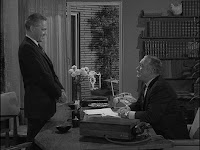

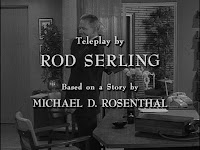
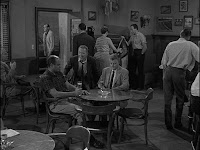


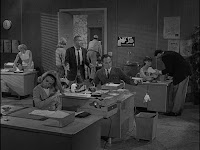
Welcome back and Happy New Year! I barely remember this episode but I enjoyed your writeup.
ReplyDeleteThanks, Jack. Happy New Year to you as well. This one seems to have a following but it never really caught my attention. There's some interesting stuff in it though.
DeleteI'd love to know if, when Rod Serling and his team created "A Kind of a Stopwatch", they were aware of H.G. Wells' short story, "The Time Accelerator". In that story, a scientist invents a potion which, when ingested, speeds up a person's metabolism by a huge number of factors, so that, as he moves around, everyone and everything else seems to him to be frozen in place. This strikes me as an excellent explanation of the stopwatch's power in the "Twilight Zone" story. Even in fantasies, there are limits to believability; and it is far more credible that the world goes on as usual, with only McNulty speeded up, so that everything appears frozen to him, than it is that the flow of time everywhere (in the UNIVERSE??????) is stopped by the device. It's also a much more satisfying form of poetic justice; this complete jerk never mattered to anyone when his life was "normal", and he ends by hurting no one but himself.
ReplyDelete